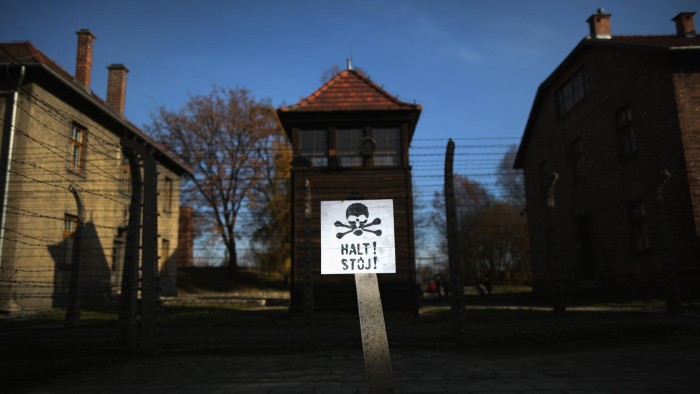Auschwitz book-keeper admits ‘moral guilt’ as trial begins

Roula Khalaf, Editor of the FT, selects her favourite stories in this weekly newsletter.
An Auschwitz guard, standing trial in what is likely to be one of the last big Nazi-era court cases, on Monday pleaded “morally guilty” and begged forgiveness from victims — including a handful of elderly survivors who have travelled from around the world to attend the hearing.
Oskar Gröning, a 93 year-old former book-keeper at the Auschwitz death camp, is accused of being an accessory in the murder of 300,000 people.
“For me it is beyond question that I am morally guilty,” he told the court in Lüneburg, northern Germany, at the opening of the trial on Monday. I ask for forgiveness. You [the judges] must decide on the matter of legal guilt.”
The case is of historic significance since it will almost certainly be among the last big Holocaust trials because very few criminal suspects are still alive. Among the victims too, the number of witness survivors is rapidly dwindling.
Mr Gröning, who has often spoken openly of his role at Auschwitz, has described himself as a “small cog in the machine” — and has frequently accepted moral but not legal guilt.
A bank clerk before he volunteered for the SS and was sent to Auschwitz in 1942, Mr Gröning was responsible for collecting prisoners’ belongings when they arrived at the camp and were being sorted into those deemed fit for work and those destined for the gas chambers.
By his own account, he had misgivings about the death camp and applied three times to leave — finally succeeding in the last months of the war and securing a transfer to the western front.
While altogether 1.1m people died in Auschwitz, most of them Jews, prosecutors have limited the case for legal reasons to one operation — the round-up of Hungarian Jews in 1944, in which 425,000 were sent to the death camp and 300,000 died.
Mr Gröning has long been known to German prosecutors. A case against him was dropped in 1985 because officials then pursued only suspects with a direct role in the killings or in positions of authority.
But prosecutors were encouraged to try again by the well-publicised case of Ivan Demjanjuk, who in 2011 was convicted of being an accessory to mass murder at the Sobibor extermination camp — even though there was no evidence against him of a specific crime.
Demjanjuk died in 2012 before an appeal he lodged could be heard, so remains innocent under German law. But prosecutors reopened the files on about 30 other former death camp guards and decided to bring three to trial, with Mr Gröning the first in line.
Thomas Walter, a lawyer for survivors who are plaintiffs in the case, told reporters before the trial that the aim was to “give back some dignity which they lost forever in the gas chambers of Auschwitz”.
Mr Gröning’s lawyer, Hans Holtermann, has said that his client’s involvement in murder was too limited to warrant conviction as an accessory.
But Eva Kor, an 81-year-old Jewish woman from New York who survived Auschwitz but lost her parents in the camp, disagrees. A plaintiff in the trial, she told a German newspaper: “For me [Gröning] is a murderer because he was part of a system of mass murder. And this is perhaps our last chance to get information about Auschwitz from a perpetrator.”
According to the Auschwitz-Birkenau Museum, only around 800 of the 8,000 SS personnel at the camp have ever been brought to trial. Most of these — around 670 — were suspects extradited from Germany to Poland, where the camp was located, soon after the war. The authorities in West and East Germany — and later in the united Germany — pursued far fewer cases. The museum says on its website: “Altogether no more than 15 per cent of the Auschwitz personnel have been brought before the courts in any country. Even so, this is a high figure compared with other concentration camps.”
Comments